Year 4
The English curriculum is built around the three interrelated strands of language, literature and literacy. Teaching and learning programs should balance and integrate all three strands. Together, the strands focus on developing students' knowledge, understanding and skills in listening, reading, viewing, speaking, writing and creating. Learning in English builds on concepts, skills and processes developed in earlier years, and teachers will revisit and strengthen these as needed.
In Years 3 and 4, students experience learning in familiar contexts and a range of contexts that relate to study in other areas of the curriculum. They interact with peers and teachers from other classes and schools in a range of face-to-face and online/virtual environments.
Students engage with a variety of texts for enjoyment. They listen to, read, view and interpret spoken, written and multimodal texts in which the primary purpose is aesthetic, as well as texts designed to inform and persuade. These encompass traditional oral texts including Aboriginal stories, picture books, various types of print and digital texts, simple chapter books, rhyming verse, poetry, non-fiction, film, multimodal texts, dramatic performances and texts used by students as models for constructing their own work.
The range of literary texts for Foundation to Year 10 comprises Australian literature, including the oral narrative traditions of Aboriginal and Torres Strait Islander Peoples, as well as the contemporary literature of these two cultural groups, and classic and contemporary world literature, including texts from and about Asia.
Literary texts that support and extend students in Years 3 and 4 as independent readers describe complex sequences of events that extend over several pages and involve unusual happenings within a framework of familiar experiences. Informative texts include content of increasing complexity and technicality about topics of interest and topics being studied in other areas of the curriculum. These texts use complex language features, including varied sentence structures, some unfamiliar vocabulary, a significant number of high-frequency sight words and words that need to be decoded phonically, and a variety of punctuation conventions, as well as illustrations and diagrams that support and extend the printed text.
Students create a range of imaginative, informative and persuasive types of texts including narratives, procedures, performances, reports, reviews, poetry and expositions.
(source: www.australiancurriculum.edu.au)
Achievement Standard
Receptive modes (listening, reading and viewing)
By the end of Year 4, students understand that texts have different text structures depending on purpose and context. They explain how language features, images and vocabulary are used to engage the interest of audiences. They describe literal and implied meaning connecting ideas in different textsÂ
They fluently read texts that include varied sentence structures, unfamiliar vocabulary including multisyllabic words. They express preferences for particular types of texts, and respond to others' viewpoints. They listen for and share key points in discussions.
Productive modes (speaking, writing and creating)
Students use language features to create coherence and add detail to their texts. They understand how to express an opinion based on information in a text. They create texts that show understanding of how images and detail can be used to extend key ideas.
Students create structured texts to explain ideas for different audiences. They make presentations and contribute actively to class and group discussions, varying language according to context. They demonstrate understanding of grammar, select vocabulary from a range of resources and use accurate spelling and punctuation, re-reading and editing their work to improve meaning.
(source: www.australiancurriculum.edu.au)
- Plus Plan
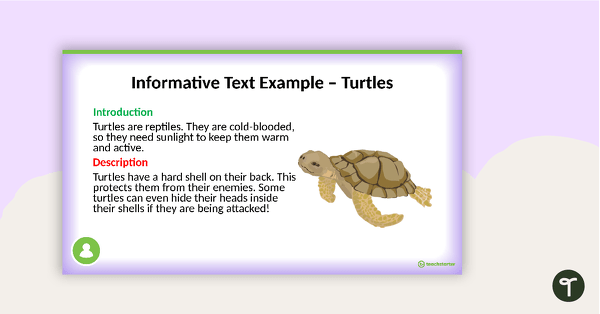
Developing Informative Writing Skills PowerPoint
A 19 slide editable PowerPoint template to use when teaching your students about the structure and language features of informative texts.
- Plus Plan
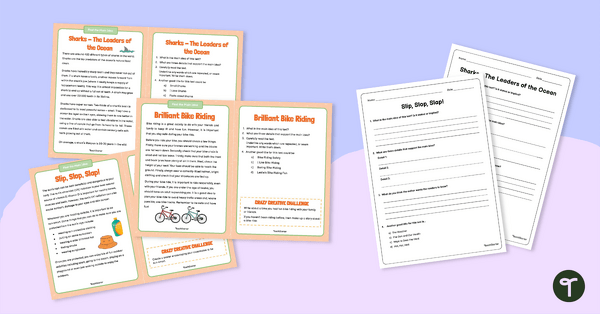
Comprehension Task Cards - Finding The Main Idea
A set of comprehension task cards to help students find the main idea when reading.
- Plus Plan
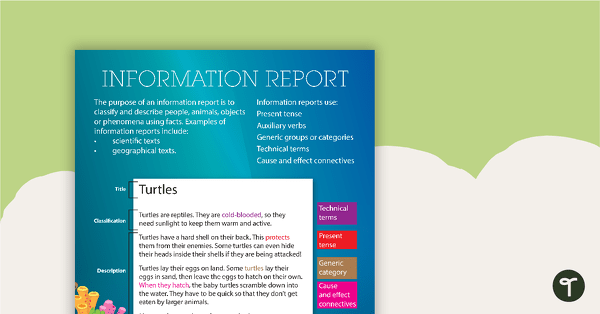
Information Report Text Type Poster With Annotations
A poster about the information report text type, including an annotated example.
- Plus Plan
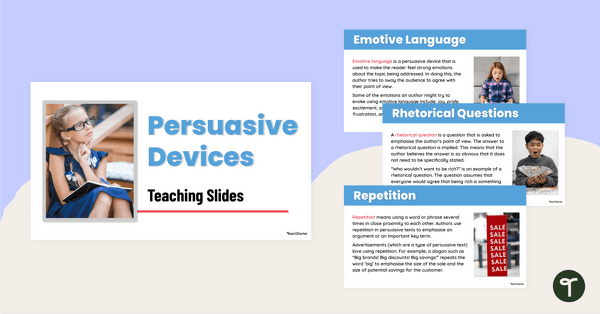
Persuasive Devices Teaching Slides
Explore persuasive language devices with your students using this detailed and age-appropriate slideshow perfect for your persuasive writing unit.
- Plus Plan
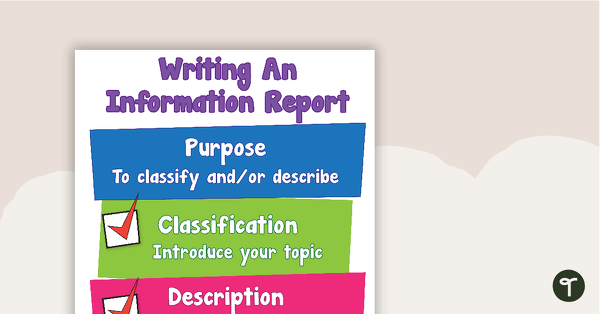
Writing An Information Report Poster
Display this poster in your room as a visual reminder of the structure of an information report.
- Free Plan
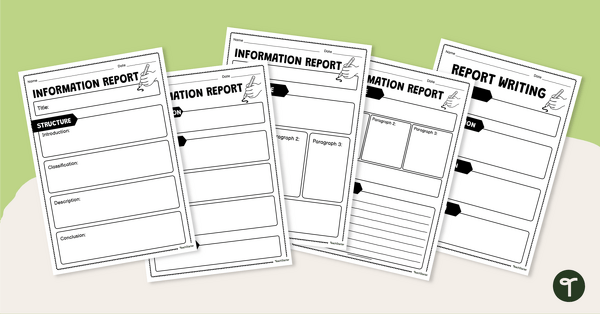
Informative Text Writing Graphic Organiser Pack
Make writing an informative text easy with free graphic organisers for your students!
- Plus Plan
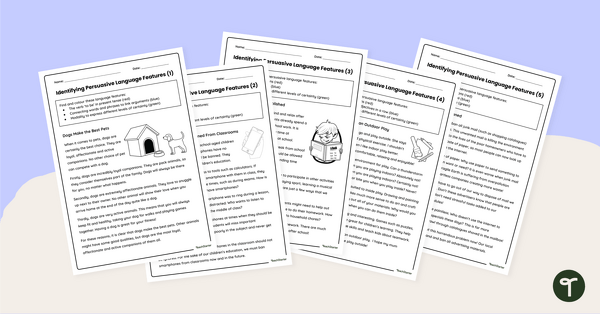
Identifying Persuasive Language Worksheets
Explore persuasive language with your students using this set of five persuasive texts on a variety of age-appropriate topics.
- Plus Plan
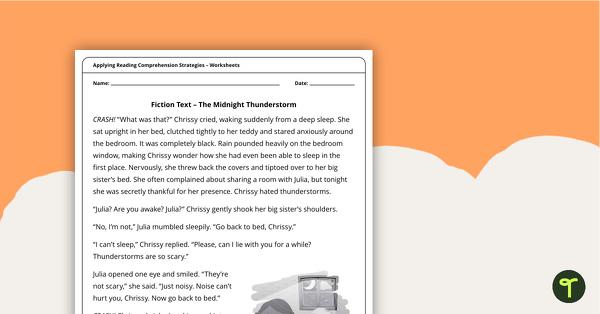
Applying Reading Comprehension Strategies Worksheets
A collection of worksheets to enable students to apply reading comprehension strategies.
- Plus Plan
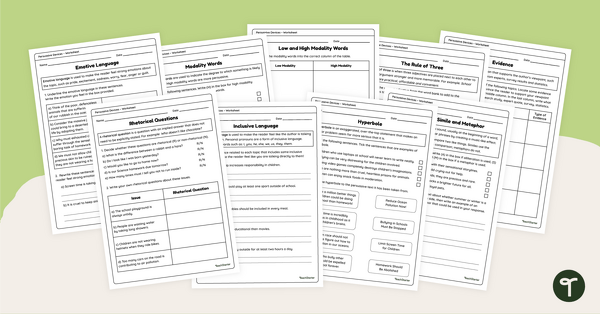
Persuasive Devices Worksheet Pack
Explore persuasive language techniques with your students using this nine-page worksheet pack perfect for your persuasive writing unit.
- Plus Plan
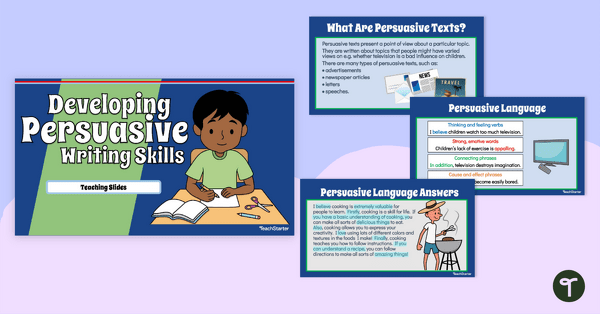
Developing Persuasive Writing Skills PowerPoint (Year 3 and Year 4)
Teach your students about the structure and language features of persuasive texts with these interactive teaching slides.
- Plus Plan
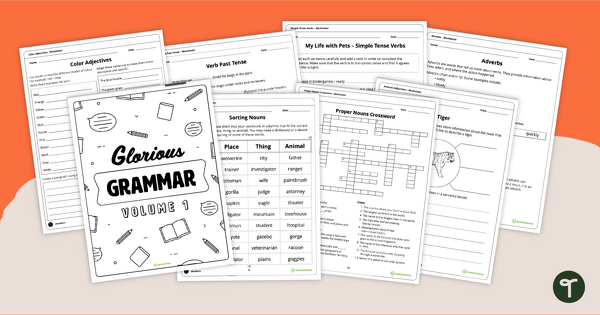
Glorious Grammar Volume 1 - Worksheet Book
50 activities in one booklet which all revolve around learning grammar in the classroom.
- Free Plan
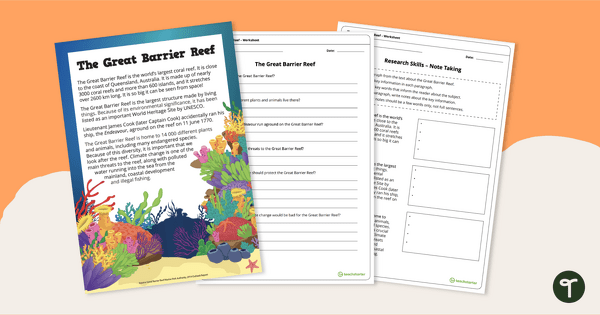
Great Barrier Reef Comprehension and Note Taking Worksheet
Learn about The Great Barrier Reef with a reading comprehension and note-taking activity.
- Plus Plan
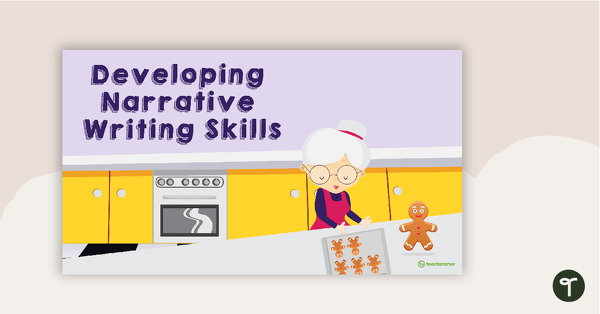
Developing Narrative Writing Skills PowerPoint - Year 3 and Year 4
A 18 slide editable PowerPoint template to use when teaching your students about the structure and language features of narrative texts.
- Free Plan
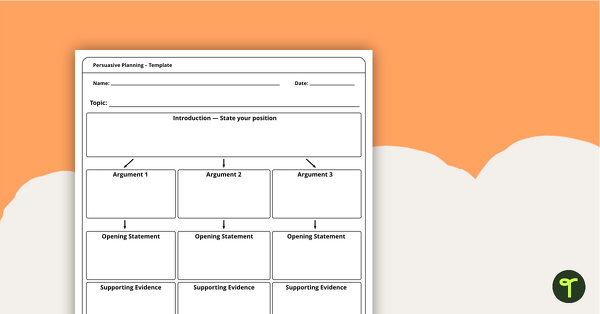
Persuasive Planning Template
A planning template to assist students in writing a well-structured persuasive text.
- Plus Plan
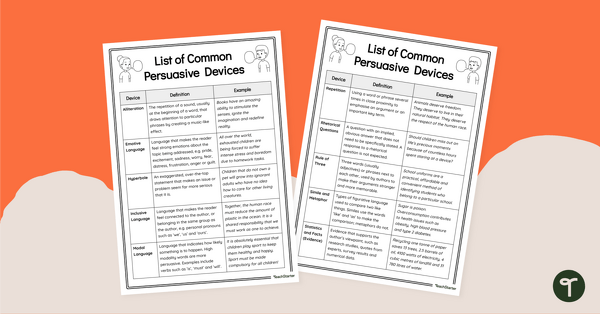
List of Persuasive Devices
Download this list of persuasive devices for your students to refer to when writing a persuasive text.
- Free Plan
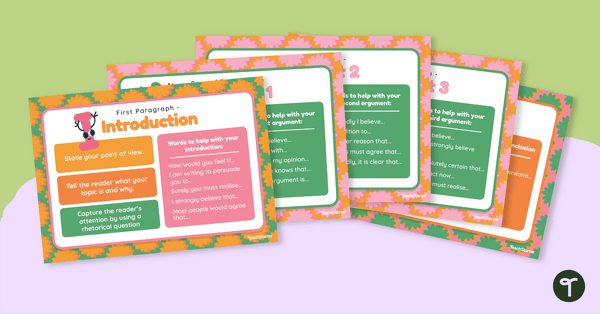
Persuasive Text Structure Posters
Explore the structure of persuasive writing with this set of 15 posters.
- Free Plan
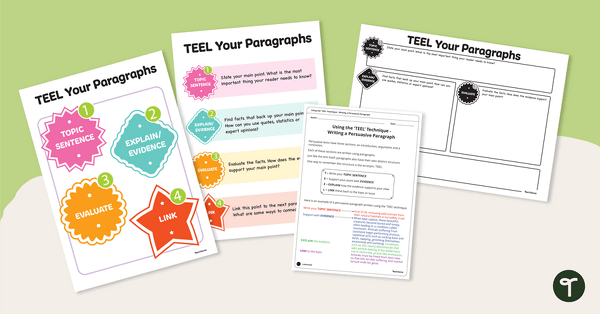
TEEL Paragraph Structure Poster and Worksheets
Explore the acronym TEEL to help with paragraph technique during persuasive writing lessons.
- Plus Plan
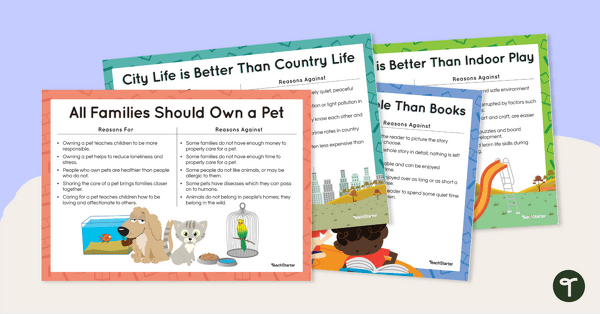
Persuasive Text Writing Prompts - Complete Set
A set of 5 persuasive writing prompts, covering a variety of topics.
- Plus Plan
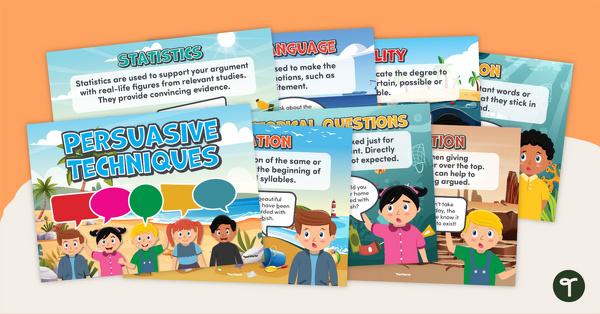
Persuasive Techniques Posters
Support students to improve their persuasive writing with these persuasive techniques posters.
- Plus Plan
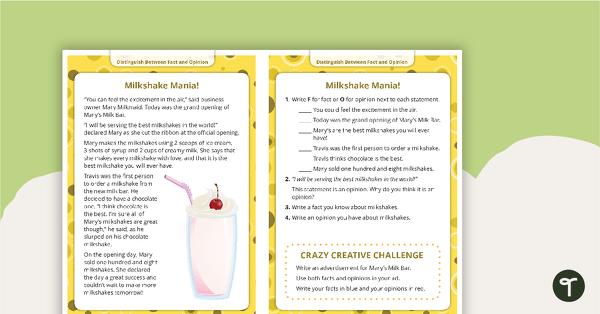
Comprehension Task Cards - Distinguishing Between Fact and Opinion
A set of comprehension task cards to help students distinguish between fact and opinion when reading.
- Plus Plan
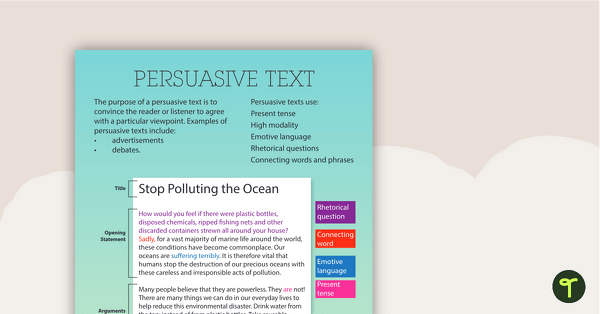
Persuasive Text Type Poster With Annotations
A poster about the persuasive text type, including an annotated example.
- Plus Plan
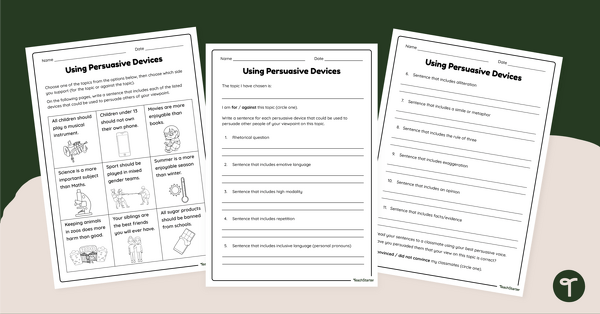
Using Persuasive Devices Worksheet
Use this persuasive devices worksheet to help your students create persuasive device examples based on a specific topic.
- Plus Plan
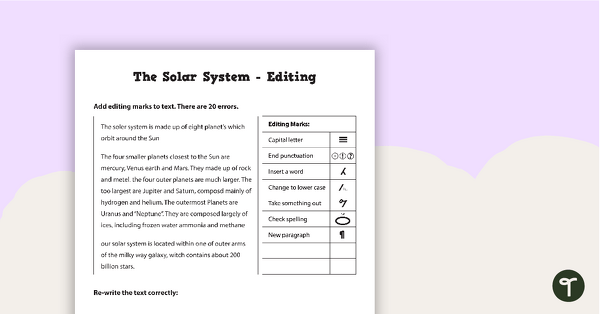
18 Editing Worksheets - Spelling, Grammar and Punctuation
Twenty editing worksheets for spelling, grammar and punctuation.
- Free Plan
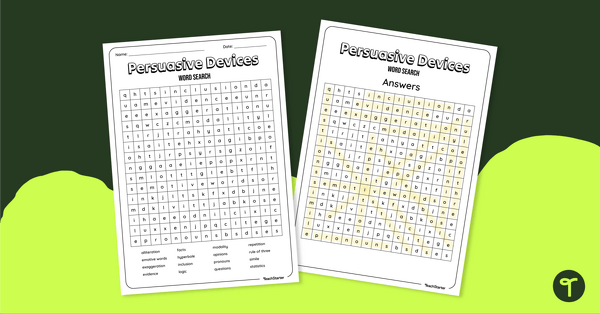
Persuasive Devices Word Search
Familiarise your students with the most common persuasive devices with a fun word search.
- Plus Plan
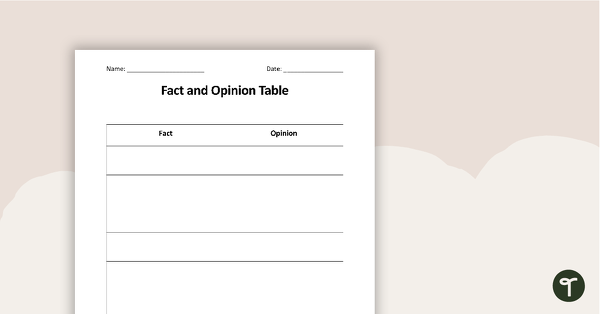
Fact or Opinion - Sentence Sort Worksheet
A worksheet to use when teaching students how to distinguish between fact or opinion.
- Free Plan
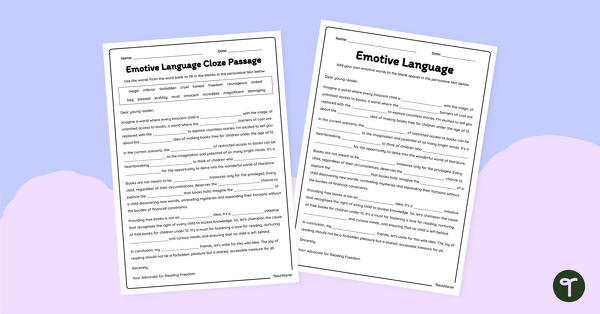
Emotive Language Cloze Passage Worksheet
Get students using emotive language examples in their persuasive writing with this differentiated cloze passage worksheet.
- Plus Plan
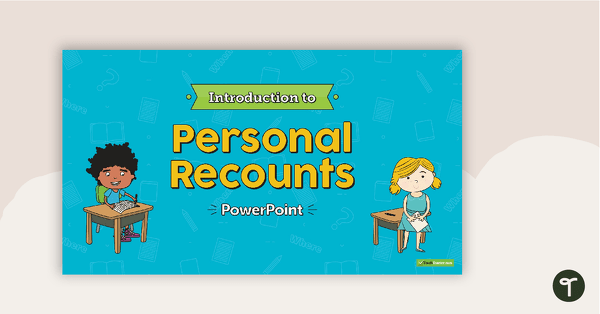
Introduction to Personal Recounts PowerPoint
An 18 slide editable PowerPoint template to use when teaching younger students about the structure and language features of personal recounts.
- Plus Plan
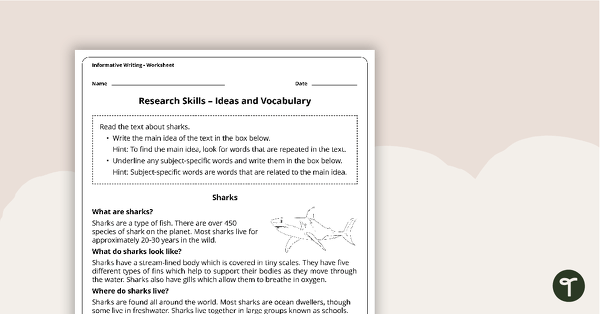
Research Skills Worksheets - Note Taking
A set of 6 worksheets to help students identify key facts, details and vocabulary when researching information.
- Plus Plan

Poetic Devices PowerPoint
A 23 slide editable PowerPoint template to use when introducing students to poetic devices.
- Plus Plan
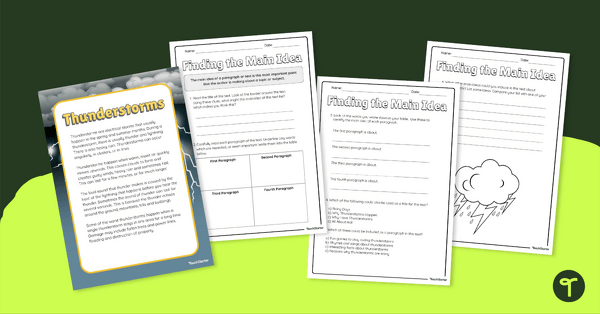
Finding the Main Idea - Comprehension Task (Thunderstorms)
A task to use when teaching your students reading comprehension strategies.
- Plus Plan
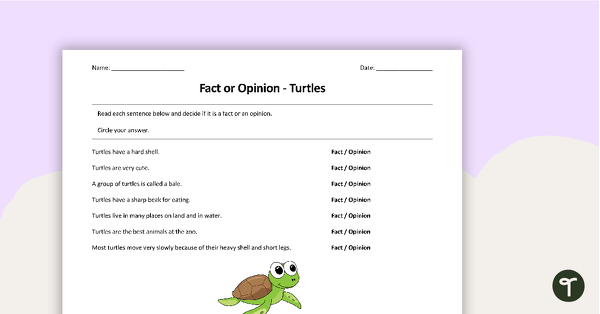
Fact or Opinion - Turtle Worksheet
A worksheet to use when teaching students how to distinguish between fact or opinion.
- Plus Plan
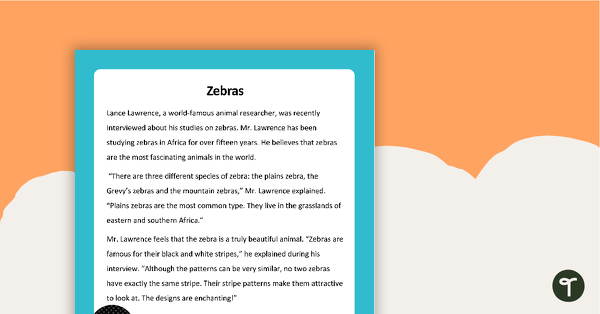
Distinguishing Between Fact and Opinion - Comprehension Task
A task to use when teaching your students reading comprehension strategies.